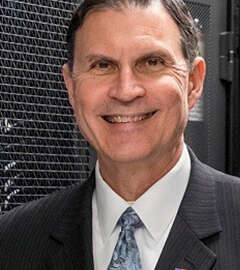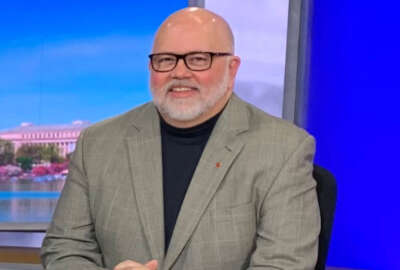
Why it’s time to renew passion for public service, and how you can help
Federal, state, and county agencies often talk about providing good service to citizens, being transparent, and being good stewards of taxpayer dollars. But how do...
Best listening experience is on Chrome, Firefox or Safari. Subscribe to Federal Drive’s daily audio interviews on Apple Podcasts or PodcastOne.
Federal agencies, and state and county agencies for that matter, often talk about providing good service to citizens. About being transparent. About being good stewards of taxpayer dollars. But how do they engender passion for public service in the first place? That’s the subject of a new book by an old hand at public service and what makes it look. It’s called Managing Organizations to Sustain Passion for Public Service. Its author, Indiana University emeritus professor of public and environmental affairs James Perry, joined Federal Drive with Tom Temin to discuss.
Interview transcript:
Tom Temin: Jim, good to have you back.
James Perry: Thanks, Tom. Great to be with you.
Tom Temin: What prompted you to write a book at this time about that idea of engendering passion for public service?
James Perry: Well, two elements, one that I might sort of classify as supply and the other is demand. But what’s happened during the last 30 years is we’ve had this flowering of new social and behavioral science research, which I think is now actionable. We have a critical mass of new evidence about motivation and behavior, that puts us in a position to redesign civil service systems, change organizational policies, and modify management practices. That’s the supply element. On the demand side, it occurred to me when I was spending some time in Hong Kong from 2014-2016. And I got involved with the United Nations Development Program, that there are lots of countries around the world, including the UNDP as an agent for many developing countries that are trying to diffuse this research that we’ve been doing during the last 30 years. And so there’s a strong demand in the developing world to create something called what they refer to as a public service ethic. But they also refer to it in the terms that I’ve been involved in coining, which is public service motivation.
Tom Temin: Got it. And of course, in the book, you cite quite a number of fellow scholars that have done work in this area going back 20, 30 years, as you point out, and one of the chapters has a really great title, and I’m one of the maybe discuss with you what is behind that. Leveraging the meaningfulness of public work, which is something I guess we’re talking about, that agencies can do within themselves. We’re not talking about external factors, but really what the government does for itself, correct?
James Perry: Yeah, this is something that managers and leaders, executives in the federal government or any government need to be thinking about. I start the chapter with an anecdote that’s traveled well in the federal government. It’s about a chance meeting between President Kennedy and a janitor at Cape Canaveral in 1962. And Kennedy is, at least the legend suggests, asked the janitor, you know, what is your job? What are you doing? And the janitor responded to President Kennedy said, Oh, Mr. President, I’m not mopping the floors, I’m putting a man on the moon. And this is an anecdote that’s traveled around government for many years, certainly in the federal government. Two years ago, a scholar at the University of Pennsylvania wrote an article for prestigious journal, really talking about this idea of using sort of the work that people in the public sector do, all not only in the public sector, and sort of elevating the meaningfulness of what they do. And there’s a survey of evidence, for instance, that suggests that in general, public work is considered more useful, and there are fewer perceived useless jobs in the public sector. So those considerations all lead to this idea that you can create meaning in your work. And it’s particularly accessible in the public sector. And so I talk about a lot of experimental evidence and a lot of other research to identify ways that managers, organizations, executives, can sort of elevate the meaningfulness of public work. And I think it’s a powerful tool. And to be honest, I’ve been at this for almost 50 years. And it’s something that we’ve not sort of embraced as strongly as we should in the public context.
Tom Temin: And with having a whole new crop of political appointees coming into the government right now, what’s the single most important thing they can do to leverage that meaningfulness?
James Perry: Well, you know, one is I think to talk about the difference that public service makes. And that’s sort of the beginning of this idea of public service, motivation. You know, people come to government for lots of reasons. Sometimes they come for extrinsic rewards, you know, money, pensions and other things. But by and large, many of them come because they want to make a difference. And we need to capture that, we need to put that front and center, that’s sort of one of the bottom lines of the book, that is public service should be central to the way we think about how we manage our government organizations.
Tom Temin: We’re speaking with Jim Perry, professor emeritus of public and environmental affairs at Indiana University, and author of the new book Managing Organizations to Sustain Passion for Public Service. And allied with that idea of leveraging the meaningfulness of work, I guess, the next chapter kind of as a corollary there, and that is creating a supportive work environment. You hear a lot about that type of talk. It doesn’t always happen in every agency, though. Does it?
James Perry: It doesn’t, and I get into some of the particulars for why it doesn’t. But first and foremost, I think we need to understand that the idea of civil service systems and the idea of meritocracy is at the heart of creating a supportive work environment. And to the extent that we can create a meritocratic set of arrangements, institutional arrangements, we have a much better chance of creating a supportive work environment that lifts up everybody in the organization. And I sort of make two points at the outset of that chapter. One is that the civil service rule systems that buffer bureaucrats or public servants from politicians generates a sort of a marvelous collective good, it creates space for people to do the right thing, people to act according to what’s appropriate rather than consequences. The other point I make is that that freedom that people are given in the context of civil service systems, also permits individual employees to pursue their basic psychological needs, which has a lot of support in the theory, particularly on self determination. There are three in particular competence, autonomy, and relatedness. And I use examples of individuals, mainly from the federal government, Paul O’Neill, our late secretary of the treasury, and the namesake for my school, David Grant, who is recently elected to the National Academy of Public Administration. David provides a marvelous story about his work as an intern 35 years ago, and he had so much freedom and so much autonomy, that that led him to pursue a federal career for 35 years, not just for the period of the internship, but to stick with it. And then the other example I use with respect to relatedness as the head of the European Space Agency, and also Thad Allen, who was the leader of the Gulf oil spill response, but providing the freedom to pursue basic psychological needs is something that exists in most government organizations, if we simply manage the civil service system, and the rules that govern it appropriately.
Tom Temin: And that gets to kind of the heart of the book in some ways, which is divided into two separate chapters, I think six and nine, if I recall, but you discuss aligning compensation systems with public service motivations, that’s always a tough one for agencies, given pay scales, in some cases, in the private sector. And then even larger is designing civil service to unleash passion for public service. I see that as kind of a grand message that you’ve got. And so how do we get to that point to redesign civil service, redo compensation within the constraints that the government has, and yet create that passion or engender that passion or continue it for those that are already there?
James Perry: Yeah, well the final chapter on designing civil service systems to unleash passion really draws from terminology. That’s this idea of passion that is used by the United Nations Development Program. But the final chapter summarizes everything that precedes it in the book, and the substance of the book with respect to proposals for reforming civil service runs from chapters three through eight. And I try to summarize that in chapter nine. The reality is that many things can be done by managers and executives without reforming the civil service, without modifying the legal foundations for civil service. We’ve not sort of embraced that, I think in the way we need to systematically across our government organizations. Now, the issue of compensation is complex, but certainly one of the keys to unleashing passion. For instance, I’ve been involved in studying the pay-for-performance in the federal civil service since the Civil Service Reform Act of 1978. We’ve been involved in the same debates, you know, pay-for-performance or not pay-for-performance. The reality is that paying for performance often deflects people from that passion from the sort of the intrinsic rewards they get from their work. So part of my proposals related to compensation, which are supported widely by research, is for people to think in terms of providing the freedom again for people to pursue their passion, and not color that with extrinsic motivations that may drive out or diminish their passion for their jobs. And so a couple of the proposals in the compensation chapter one is I argue for total compensation as the benchmark. We haven’t used that in the federal civil service, it’s not used in most countries. And the fact is that in many societies, people believe that civil servants are overpaid. We need to move away from that. Partly, it’s a perception, may not be the reality, but we need to sort of move toward a set of rules that convey to the general public, hey, that we’re not about the money, that we’re not about the compensation, we’re about public service as again, sort of being the core and the basic principle. But we also I think, need to move away from ideas like performance related pay, which I classify as what I refer to as high powered incentive systems and move to the lower powered incentive systems where recognition, for instance, is more important. Those sorts of incentive systems decreased the prospect of crowding out intrinsic motivations, which are much more powerful and important to many public servants and crowding in the power of intrinsic motivation and elevating that to its rightful position for public servants.
Tom Temin: And a final question, do unions have a useful role in this whole equation? Or do they tend to do you think, follow their own needs and requirements as they get bigger and bigger?
James Perry: Well, I started out, I did my dissertation in 1974, unions and collective bargaining. So I’ve been with that subject for almost 50 years. I think unions can play a positive role. I think, for instance, in the federal government, presently, unions are not in a position to play the positive role they need to play. So I think unions can become a partner, a collaborator. But we need to find ways of structuring the institutions to put unions in a position to do that. Presently, I think, certainly in our, the way our federal labor laws are for federal employees are structured, they’re not in a position to do that. But I think unions can play a positive role and I think need to play a positive role. But presently, I think there’s many situations where unions are the problem rather than the solution.
Tom Temin: Jim Perry is professor emeritus of public and environmental affairs at Indiana University, and author of Managing Organizations to Sustain Passion for Public Service. Thanks so much for joining me.
James Perry: Thanks, Tom. Good to be with you.
Copyright © 2025 Federal News Network. All rights reserved. This website is not intended for users located within the European Economic Area.
Tom Temin is host of the Federal Drive and has been providing insight on federal technology and management issues for more than 30 years.
Follow @tteminWFED
Related Stories





